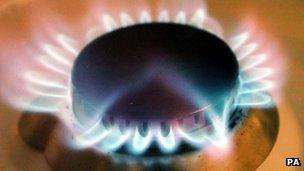Energy bill rises push more into fuel poverty
- Published

Some suppliers have hinted at rising prices for domestic customers in the coming winter
Gas and electricity price rises at the end of last year are expected to have pushed 400,000 more households in England into fuel poverty.
The projected increase, reported by the Department for Energy and Climate Change (DECC), took the total to 3.9 million households.
However, the rise came after a period of falling fuel poverty.
A household is considered to be in fuel poverty if it spends more than 10% of its income on heat and power.
Projections
The DECC figures showed that across the UK, there were 5.5 million households in fuel poverty in 2009, falling to 4.75 million in 2010.
This figure included some 3.5 million in England in 2010, and four million in 2009.
DECC does not have a UK-wide projection for fuel poverty in 2012. However, these more historic figures show Northern Ireland was the most fuel poor part of the UK, at an estimated 44% of households.
In Scotland, 28% of the population were fuel poor, Wales was at 26%, and England stood at 16%.
Projections for England indicate there are likely to be around 3.5 million fuel poor households in 2011 and 3.9 million in 2012.
Since then, there have been modest cuts in prices at the start of this year.
Help with bills
"Fuel poverty remains a serious national problem and the coalition [government] is absolutely committed to tackling it," said Energy and Climate Change Minister Greg Barker.
"People can still get help with heating and insulation through Warm Front, external and around two million households will get money off their energy bills this year through the Warm Home Discount Scheme, external."
A number of energy suppliers have hinted that prices will rise this winter, owing to increasing wholesale costs.
This would place more pressure on households having difficulty paying these bills.
"It is a major concern that so many people are struggling to afford their energy bills," said Audrey Gallacher, of watchdog Consumer Focus.
"Millions of families, older people and disabled people, living on low incomes, will be facing tough daily decisions on what essentials they cut back on to make ends meet.
"Current Government plans are not sufficient to tackle the scale of this problem."
Caroline Flint, the shadow energy and climate change secretary, said: "Ministers must not push people back into fuel poverty.
"The government should get behind Labour's plans to put all over-75s on the cheapest tariff and overhaul the energy market to deliver fair prices for all."
- Published14 May 2012
- Published25 July 2011
- Published27 July 2011